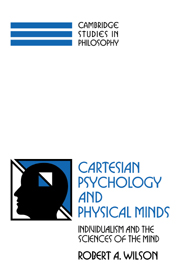Book contents
- Frontmatter
- Contents
- Preface
- 1 Introduction: What is individualism in psychology?
- PART I ON ARGUMENTS FOR INDIVIDUALISM
- 2 An a priori argument: the argument from causal powers
- 3 An empirical argument: the computational argument
- 4 Methodological arguments
- PART II PSYCHOLOGICAL EXPLANATION AND MENTAL CAUSATION
- PART III THE CASE AGAINST INDIVIDUALISM
- References
- Index
4 - Methodological arguments
Published online by Cambridge University Press: 05 June 2012
- Frontmatter
- Contents
- Preface
- 1 Introduction: What is individualism in psychology?
- PART I ON ARGUMENTS FOR INDIVIDUALISM
- 2 An a priori argument: the argument from causal powers
- 3 An empirical argument: the computational argument
- 4 Methodological arguments
- PART II PSYCHOLOGICAL EXPLANATION AND MENTAL CAUSATION
- PART III THE CASE AGAINST INDIVIDUALISM
- References
- Index
Summary
In Chapter 2 I considered an a priori argument for individualism, the argument from causal powers; Chapter 3 focussed on an empirical argument for individualism, the computational argument; in this chapter I consider two methodological arguments for individualism. What is the methodological clout of individualism? More particularly, are there methodological reasons for adopting individualism as a constraint on the study of cognition?
A PRIORI, EMPIRICAL, AND METHODOLOGICAL ARGUMENTS
Methodological arguments have remained very much in the background of the debate over individualism, in part because such arguments rely less directly on general, intuitive considerations that support individualism, and because the distinction between individualistic and wide psychology has not typically been drawn in terms of methodology. If there are facts about how narrow and wide explanations operate or must be developed that imply the methodological coherence or the empirical fruitfulness of only the former, then there is reason to think that research in the cognitive sciences ought to be individualistic. Such arguments are stronger than either the a priori or empirical arguments we have examined in that, if sound, they leave no further room for an appeal to explanatory practice in psychology.
We can also view these three arguments – the a priori, the empirical, and the methodological – as forming a series of possible concessions to the anti-individualist; in this respect, each of these arguments is weaker than that which precedes it.
- Type
- Chapter
- Information
- Cartesian Psychology and Physical MindsIndividualism and the Science of the Mind, pp. 93 - 114Publisher: Cambridge University PressPrint publication year: 1995

